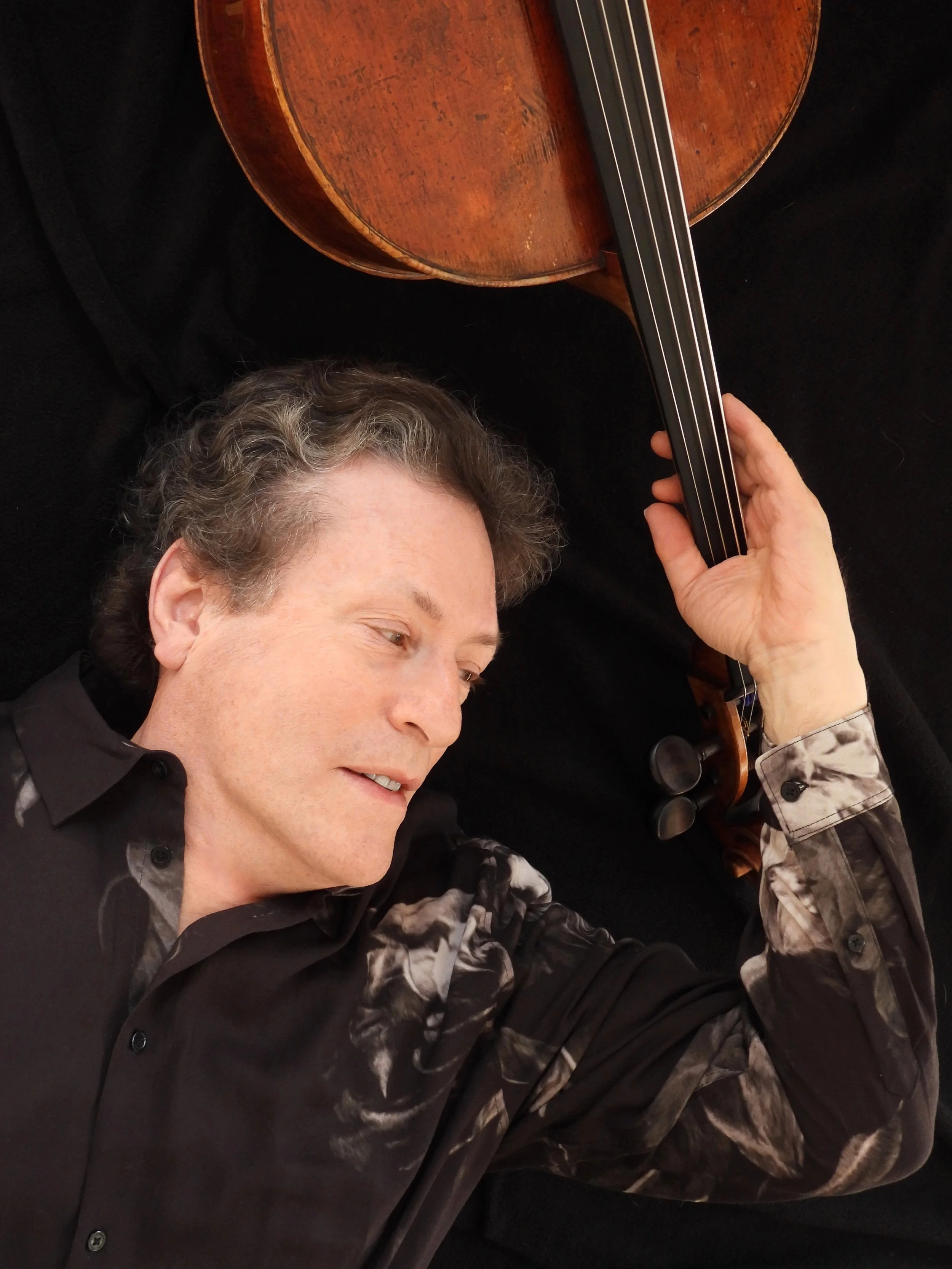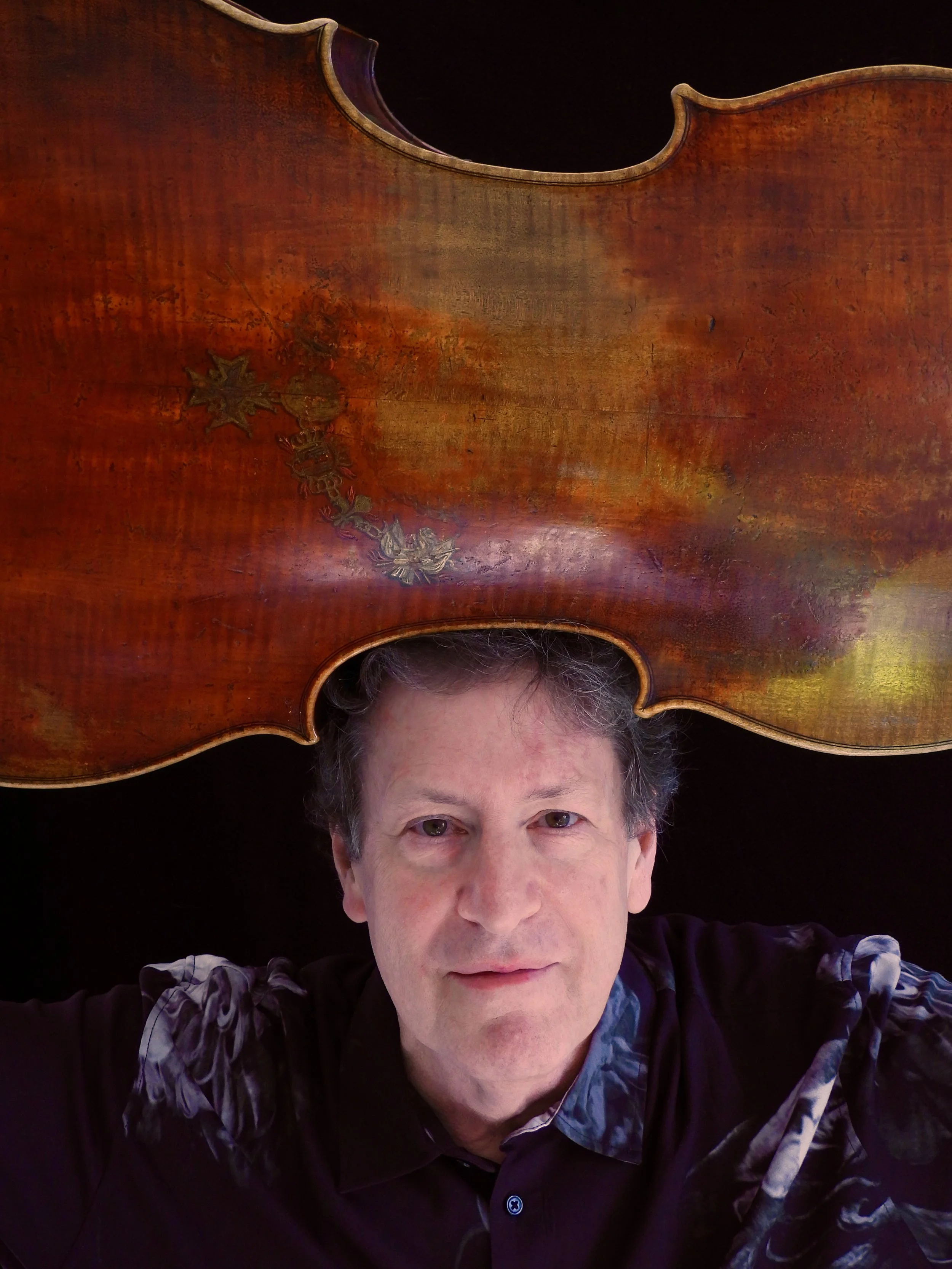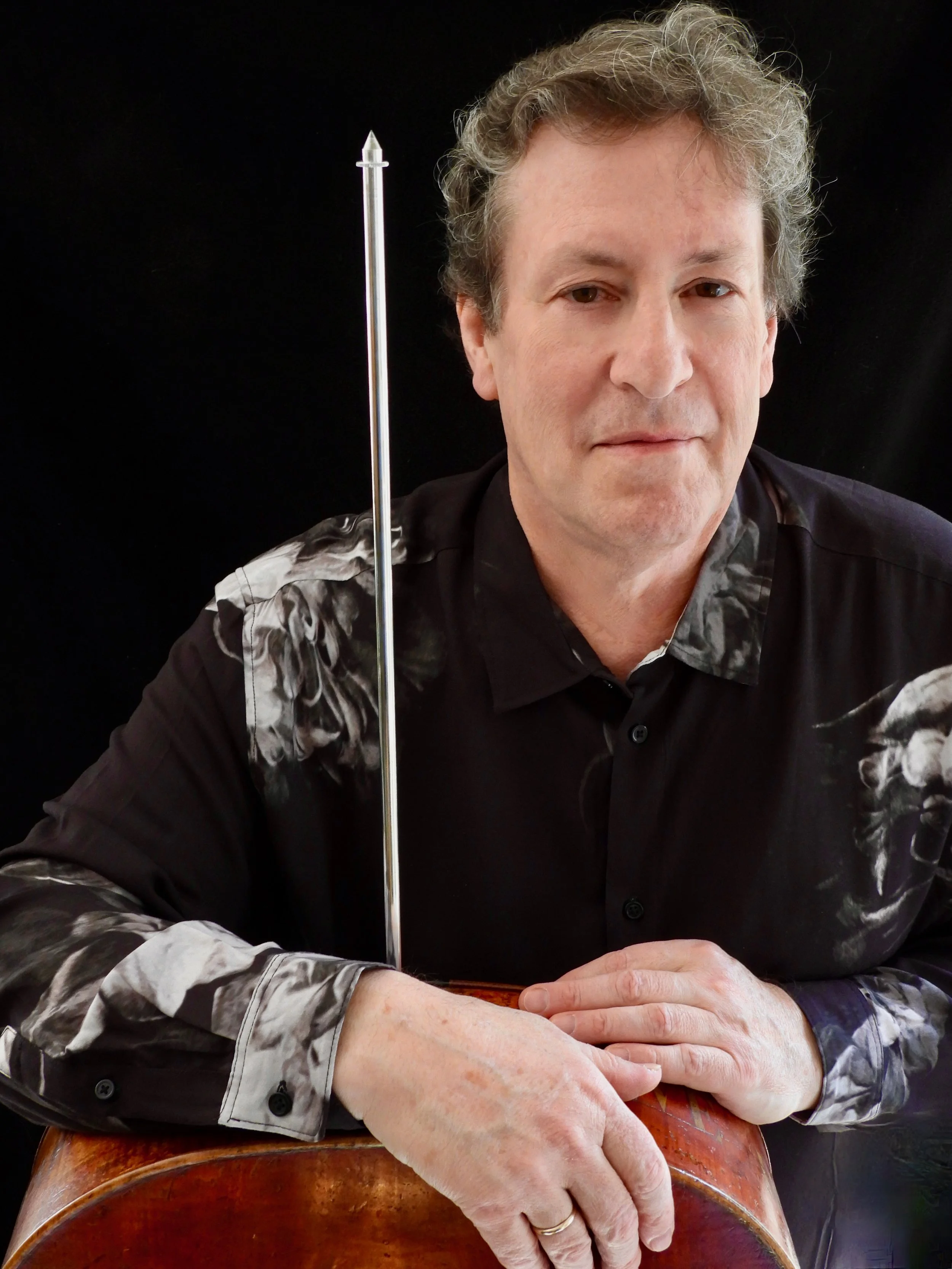Press
Reviews of Ernest Bloch: Schelomo and Suite for Viola and Orchestra
Featured in Gramophone’s Editor's Choice: August 2025 | The best new classical recordings
★★★★ “In Kenneth Woods, Karp secures the ideal collaborator. The rapport is absolute, and Woods is all over both works’ turbulent dramas and intricate interweaving motifs.” – BBC Music Magazine
“Karp is fully attuned to its understated charm and Kenneth Woods, who directed the likely premiere of this version in 2008, secures playing of sensitivity and imagination from the BBC NOW.” – Arcana FM
“The performance by Karp and Woods is all that one could wish for, conveying the atmosphere and energy of Bloch’s inspired writing and finding a breathtaking sense of fantasy in the lyrical central episode of the final movement.” – Gramophone
“ Parry Karp steers an adroit path between delivering the intense soaring melodic invention with passion, and reining in the fervour to create contrast.” – The Strad
Full BBC Music Magazine Review
Reviewed by Paul Riley
Parry Karp and Ernest Bloch are longtime companions. It was hearing Schelomo at the age of nine that clinched Karp’s determination to become a cellist. And as a veteran member of the Pro Arte Quartet he’s recorded all five string quartets and the piano quintets, while the Three Solo Suites also augment a discography that includes Schelomo in its piano-accompanied incarnation. It was, moreover, his teacher Gábor Rejto (together with Adolphe Baller) who reworked for cello the Suite for Viola and Orchestra —recorded here for the first time.
The pedigree ensures an authority that is felt right from the enrapt intensity of Schelomo’s long-held first note. Karp sustains the psychological narrative with compelling empathy; pugnacious as needed, yet always supple when it comes to the rhapsodic cadenza-like interjections whose contours evoke the troubled state of King Solomon’s despairing reflection on earthly vanity and transience —a theme ominously pertinent as Bloch worked on the score during 1916.
In Kenneth Woods, Karp secures the ideal collaborator. The rapport is absolute, and Woods is all over both works’ turbulent dramas and intricate interweaving motifs. Climaxes are taut yet searingly full-blooded with no detail too small to be overlooked. (A special shout-out to the winds incidentally). Some may prefer the leaness of the Suite in its original transcription with piano, but the scoring is masterly.
From Emanuel Feurmann to Steven Isserlis and Yo-Yo Ma, Schelomo has enjoyed a distinguished recorded legacy — even so this newcomer need not fear comparison: a nine-year-old’s debt is paid, and with interest!
★★★★
Full Gramophone Review
Bloch’s Schelomo, partly inspired by the book of Ecclesiastes and partly reflecting the composer’s response to the First World War, has been lucky on record, with numerous distinguished recordings following the pioneering 1940 account by Feuermann and Stokowski. This latest version by Parry Karp, the longstanding cellist of the Pro Arte String Quartet, adds another to the list. At 23 minutes, it’s a spacious interpretation, similar in length to Rostropovich’s with Bernstein (Warner, 3/77), although not as broad as the performance Bernstein later recorded with Maisky (DG, 1/90). The accent on the cello’s opening note, underplayed or unheeded in many recordings, is clearly observed here, and throughout Karp and conductor Kenneth Woods are attentive to detail, clarity and colour. There’s also no lack of expressive intensity when required, and I would rate this alongside the recordings by Steven Isserlis and Raphael Wallfisch among the very best of recent versions.
In 1919, three years after the completion of Schelomo, Bloch composed the Suite for viola and piano and orchestrated it in the same year. The work was subsequently transcribed for cello and piano by Adolph Baller and Gábor Rejtő and recorded by them in 1969, and more recently by Wallfisch with John York (Nimbus, 7/17). This is the first recording of the work for cello and orchestra, however. Bloch’s four-movement suite, originally intended to convey the atmosphere of different east and south-east Asian countries, sounds equally at home in its adaptation for cello as it does in the original for viola, effectively bringing a fourth version to the repertoire. The performance by Karp and Woods is all that one could wish for, conveying the atmosphere and energy of Bloch’s inspired writing and finding a breathtaking sense of fantasy in the lyrical central episode of the final movement. With engineering as excellent as the performances, this is a very desirable release.
Full Review from The Strad
Reviewed by Joanne Talbot
Persuasive ardency serves this heightened music well
The musical language of Bloch’s Schelomo is highly distinctive, marrying heightened emotional lyricism with an exotic mysticism. Every now and then, the timbres have a bewitching shimmering quality that fleetingly suggests Impressionism. At other times, the charged language simply propels you forward in the narrative.
Parry Karp steers an adroit path between delivering the intense soaring melodic invention with passion, and reining in the fervour to create contrast. The sinewy cello figuration is expertly delineated, with the complex rhythmic notation accurately drawn, resulting in a seemingly spontaneous stream of melody. The rubatos are persuasive, pushing forward in agitato passages and whispering sweetly in the sul tasto writing, with piquant quartertones likewise eloquently depicted. Kenneth Woods has brought a great deal of detail into the orchestral partnership, and the BBC National Orchestra of Wales delivers an impressive tautness of ensemble.
The Suite for viola and orchestra is couched in a similar style. This version, arranged by Karp’s teacher Gábor Rejtö, and colleague Adolph Baller, shows the cello to be an idiomatic alternative, and makes a good pairing in this well-recorded release. The four movements are carefully contrasted, the third-movement Lento atmospherically languid, while the ensuing Molto vivo is rhythmically more charged and affirmative in spirit. Again, these artists offer a highly persuasive reading.
Full Arcana FM Review
Reviewed by Richard Whitehouse
What’s the story?
Signum Classics issues its first release devoted to Ernest Bloch (1880-1959), comprising what is his best-known work alongside a piece that receives its first recording in a version for cello and orchestra – making for a representative introduction to this now under-appreciated figure.
What’s the music like?
Considered in his lifetime to be on a par with such contemporaries as Bartók and Stravinsky, Bloch duly suffered that almost inevitable falling off of reputation from which his music has never quite recovered, but almost all his major works have now been recorded and often on several occasions. Among his sizable output, those with a concertante element are especially notable for their redefining the relationship between soloist and orchestra as holds good for the present works, written as they were either side of the composer’s emigration to the USA.
Its title might translate as Solomon, but Schelomo is by no means a portrait of the Biblical monarch nor is the solo part merely a ‘translation’ of lines from Ecclesiastes such as Bloch had initially intended to set. This ‘Hebraic Rhapsody’ is the last and most representative, if not necessarily the finest, of his Jewish Cycle, its three contrasting sections amounting to a concerto (or maybe a Konzertstück) in terms of their encompassing a gradually cumulative ‘exposition’, then an impulsively tense ‘development’ whose impassioned climax subsides into a ‘reprise’ which takes in a musing accompanied cadenza prior to the starkly fatalistic close. Parry Karp is a perceptive interpreter – one who never over-emphasizes its eloquence or rhetorical overkill, while rendering the piece as a cohesive and an audibly unified whole.
Conceived for viola and piano, the Suite was orchestrated soon afterward then arranged for cello a half-century on by cellist Gábor Rejtő and pianist Adolph Baller. The layout, though not so integrated as to make it a concerto, is none the less striking. Its lengthy initial Lento (originally entitled ‘In the Jungle’) pits soloist against orchestra in a fantasia-like evolution that finds effective contrast in an alternately capricious and ruminative Allegro ironico, then the songfulness of an equally compact Lento; its searching inwardness pointedly dispelled by the lively and playful Molto vivo which brings about an affirmative conclusion. Karp is fully attuned to its understated charm and Kenneth Woods, who directed the likely premiere of this version in 2008, secures playing of sensitivity and imagination from the BBC NOW.
Does it all work?
Almost always. As his introductory note makes plain, Karp has been an enthusiastic advocate for this music throughout his career and there is no doubting the extent of his commitment in either piece. Schelomo remains Bloch’s most recorded work such that those who have any one of Gregor Piatigorsky (Testament), Pierre Fournier (DG), Mstislav Rostropovich (Warner) or, more recently, Sol Gabetta (Sony) can rest content; yet this newcomer is worth a place on any shortlist and a first recording of the Suite in this guise makes the release self-recommending.
Is it recommended?
It is. Balance between cello and orchestra could not be bettered in the spacious yet analytical ambience of Hoddinott Hall, while Woods contributes his customary insightful observations. Aficionados and newcomers alike will find much to delight and absorb them on this release.
Review of Late Romantic Music for Cello and Piano
This impressive double CD set may be hard to track down but the effort is worth it. It’s produced by the University of Wisconsin-Madison School of Music, famous erstwhile home to the much-altered Rahier-Milofsky-Friedlander-Rudolph Kolisch line-up of the Pro Arte Quartet in the 1940s. Chamber music has been a profound strength of the university and that continues to this day. Howard Karp became Emeritus Professor of Music there in 2000 and to mark his retirement a two-disc set was issued. His son Parry is Professor of Music, Artist-in-Residence and director of the string chamber music programme. He’s been a member of the Pro Arte since 1976. I reviewed his disc of Bloch’s chamber music [Laurel LR-865CD] and the Quintets and the First solo cello suite [Laurel LR-848CD] with the greatest enthusiasm – terrific playing all round.
Now he and Howard Karp turn to a quartet of meaty late romantic music and add an attractive arrangement, by the cellist, of the slow movement of Strauss’s Op.18 Violin Sonata. The Ireland has received some fine performances over the years – the Navarra-Parkin has been newly reissued on Lyrita for instance though Ireland’s own recording 78 set with Antoni Sala has not been reissued. The Karps make sensible tempi decisions, though they take a slightly longer time to make their point in the slow movement than is perhaps ideal. However I like their control of tempo relationships, especially the way they lead into slower sections and bring real excitement to the finale. This is, as one would expect, superior chamber ensemble playing.
The Magnard is a powerful and lyric work. Yes, the first movement fugal passage is academic rather than inspired but the intensity and chromaticism of the writing is undeniable in this performance. The second movement is brilliantly ingenious and despatched with very considerable élan but they save the very best for the Funèbre third movement – some truly beautiful playing here. This is a very difficult work and it’s hard to encompass its moods and scope – the Karps are up to all challenges.
They are clearly also strong believers in Enescu’s ridiculously under-performed C major sonata. Maybe it’s less performed because of its complexity, its entwining of voices, the half-repetitious and expressive commentary, and frequent descents into lower register. Maybe some cellists baulk at the rather crabbed writing of the scherzo. But surely they would welcome the glorious intimacy of the Andantino cantabile and the opportunities for heart-stopping pianissimos and the movement’s expressive content. As they surely should the finale’s folkloric moments, cimbalon imitations for the piano and the general level of energy.
Rachmaninoff’s Sonata is a repertoire favourite of course but this is a subtly vibrated, subtly thoughtful performance. It’s not high octane but it obeys the chamber verities of balance and tonal congruity and ensemble discipline. It’s the kind of performance that draws one afresh to the music and not to the gestures – outsize or otherwise – of the performers.
Parry Karp is surely one of the most distinguished chamber cellists in America and together with Howard Karp he has fashioned a splendid conspectus of cello sonatas. Make an effort to seek out this two-disc set – it’s been well engineered and annotated into the bargain.
Jonathan Woolf
Review of Violoncello Music by Ernest Bloch
Bloch took to his adopted homeland with enthusiasm and it embraced the composer in turn. I have already written about the Rhapsody - America in a recording on Naxos. Another part of the North American response has come from the generosity of John C. Gilbert Ph.D., his father Herschel Burke Gilbert and their California-based Laurel Records label. Laurel have recorded all the string quartets and much else including the still rarely encountered Concerto Symphonique and the Violin Concerto. This disc is the latest volume to appear.
The Méditation Hébraïque was written as homage to Casals as a ‘thank you’ for Casals’ performances of the Bach suites which Bloch loved. It is typically soulful, with an exotic strain and a brief and jaggedly defiant piano fanfare similar in shape to the brassy fanfares in the Violin Concerto. The three episodes From Jewish Life are Prayer, Supplication and Jewish Dance. Prayer pleads eloquently. Supplication runs forward eagerly yet deferentially modest. The last movement is a rather stiff-legged dance which, like Prayer, makes use of quarter-tones to add an exotic oriental edge.
After these two pieces for cello and piano we turn to three suites for unaccompanied cello. These were written in quick succession in the composer’s final years. Suites 1 and 2 were written for Zara Nelsova at her urging. Nelsova recently enjoyed a Decca Collectors’ Edition. She premiered Bloch’s Voice in the Wilderness for cello and orchestra. As you can see from the timing, the suites are compact. When you hear them you will realise that they are succinct in expression. Approaching death clearly concentrated the message. In Suite No. 1 there is a gloomy or soulful Prelude, a flight Bachian Allegro, a concentrated Canzona played high in the register and sounding almost like a viola and finally an optimistic Allegro which is thunderous in its triumph. The Second Suite is the longest of the three. A serious Prelude is followed by a dramatic and determined rosiny Allegro, a rounded Andante tranquillo and at last an angular Allegro lit up with struggle and conflict. It ends with an optimistic ascending gesture that slips slowly into niente. The final Cello Suite has a grippingly heroic Allegro deciso, a meditative Andante, a strugglingly energetic Allegro, another Andante – this time more sorrowful than meditative and then a finale marked Allegro giocoso but which rings out here as more eroico serioso than giocoso.
The recording which was proudly made on analogue tape is gripping and of almost forbidding immediacy and impact.
The useful notes are by John Erling.
These performances are uniformly magnificent with Parry Karp giving every sign of having learnt and known these suites from the inside. The playing of Frances Reiche Karp in the first two pieces projects equal commitment and communicative passion.
Rob Barnett


